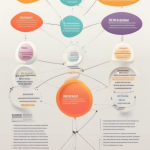Innovative AI Content Creation Ideas for Enhanced Engagement
As the digital landscape continues to evolve, leveraging AI for content creation is becoming a game-changer for marketers, bloggers, and businesses alike. Exploring innovative content creation ideas can lead to heightened engagement and a more dynamic connection with your audience. Here are some advanced strategies that utilize AI technology to enhance your content strategy.
Utilize AI for Content Personalization
One of the most effective ways to engage your audience is through personalized content. AI algorithms analyze user data to understand individual preferences and behaviors. Here’s how to implement this idea:
- Dynamic Content: Use AI tools that tailor website content based on user profiles. For example, if a visitor frequently reads articles about health, the AI can show them related posts in real time.
- Email Marketing: Segment your email lists based on reader behaviors. AI can craft personalized subject lines and content that resonate with individual interests, increasing open and click-through rates.
AI-Generated Interactive Content
Interactive content is a powerful way to increase audience participation. AI can help create engaging quizzes, polls, and interactive infographics. For instance, a travel blog could use AI to generate personalized travel recommendations based on user inputs, making the experience both fun and informative.
Consider these interactive ideas:
- Chatbots: Implement AI-driven chatbots on your website to answer user queries in real time. This can improve user experience and lead to increased time spent on your site.
- Quizzes: Use AI to design quizzes that adapt based on user responses. This tailored approach can engage users while collecting valuable data about their preferences.
Repurpose Existing Content with AI Tools
AI doesn’t just create new content; it can also help breathe new life into existing materials. Repurposing can maximize content reach. Here’s how:
- Content Summarization: Use AI to summarize longer articles into digestible formats like bullet points or infographics, making it easier for readers to grasp key insights.
- Multimedia Integration: Transform text articles into video summaries using AI tools that generate visuals based on your written content, appealing to more visually-oriented audiences.
Automate Social Media Content Creation
A strong social media presence is crucial for engagement. AI can streamline this process, allowing you to maximize your output without stretching your resources too thin. Here’s what to consider:
- Content Scheduling: Use AI-driven tools to analyze optimal posting times and frequencies for your target audience. This can help you maintain a consistent online presence.
- AI-Generated Posts: Explore AI tools capable of generating engaging social media posts and hashtags based on current trends, saving you time and effort in content creation.
Data-Driven Content Ideas
Leveraging data allows you to create insightful content that resonates with your audience. AI can sift through vast amounts of data to identify trending topics and user interests. Follow these strategies:
- Trend Analysis: Use AI tools to stay updated on trending topics in your niche. Creating content that aligns with these trends can significantly boost engagement.
- User Feedback Analysis: Implement AI to analyze user comments and feedback on your content. This can help you understand what works, what doesn’t, and how to adjust your future content accordingly.
AI-Powered SEO Optimization
AI can significantly enhance your SEO strategy by optimizing content based on current search algorithms. Here’s how:
- Keyword Research: Use AI tools for comprehensive keyword research, identifying high-ranking keywords that your competitors might overlook.
- Content Suggestions: AI can provide content generation ideas based on popular keywords and topics, ensuring that your writing remains relevant and discoverable.
By harnessing the power of AI, creators can elevate their content strategy to new heights. Engaging your audience through personalized content, interactive experiences, and data-driven insights not only boosts engagement but also fosters lasting relationships with your readers. It’s time to embrace innovative AI content creation ideas to set your brand apart in a crowded digital landscape.
The Impact of AI on Traditional Content Writing Practices
The rapid evolution of artificial intelligence (AI) is reshaping the landscape of content creation, introducing both challenges and opportunities for traditional content writers. This shift has led to a fundamental change in how content is produced, curated, and consumed, while simultaneously rethinking the roles of writers in this ever-evolving digital environment.
The Role of AI in Content Generation
As AI technologies advance, they’re becoming more adept at generating high-quality written content. Tools powered by AI can analyze vast amounts of data to create articles, blogs, and social media posts. This capability raises the question: what does this mean for traditional content writing practices?
- Efficiency: AI can significantly reduce the time it takes to produce content. Tasks that once required hours of effort can be automated, allowing writers to focus on more creative aspects of their work.
- Consistency: Brands often strive for a consistent voice across their platforms. AI provides a way to maintain this consistency, ensuring that the tone, style, and message align with the brand’s identity.
- Data-Driven Insights: AI can analyze reader engagement and preferences, helping writers understand what content resonates with their audience. This information can guide future content strategies.
The Revolution of Content Personalization
Another significant impact of AI on content writing practices is personalized content delivery. AI algorithms can serve tailored content to users based on their preferences, past behaviors, and demographics. This personalization enhances user experiences, as readers receive information tailored to their interests.
For instance, AI can analyze user interactions on various websites and suggest or create highly relevant content, increasing engagement and satisfaction. This level of personalization goes beyond broad audience segments, allowing businesses and writers to connect with users on a more individual scale.
Enhancing Creativity through Collaboration
Contrary to the fear that AI may replace human writers, it can actually position itself as a collaborative tool. This partnership allows writers to leverage AI for brainstorming and idea generation while injecting their unique voice into the content. For example:
- Idea Generation: Writers can utilize AI to generate topic ideas, outlines, or even initial drafts, serving as a springboard for creative thought.
- Editing and Proofreading: AI tools can also assist in refining content by checking grammar, style, and suggestions for improvement, enabling writers to polish their drafts more efficiently.
- SEO Optimization: With integrated SEO capabilities, AI assists writers in crafting content that not only captures reader interest but also adheres to search engine requirements, increasing visibility.
The Ethical Considerations
While AI undeniably enhances content creation, it raises important ethical considerations. The use of AI-generated content must be transparent, ensuring that audiences know when they’re reading human-written versus AI-generated material. This transparency is pivotal in maintaining trust between creators and their audiences.
Moreover, content writers must navigate the potential for misinformation. Since AI relies on existing data, it can inadvertently perpetuate false information if not monitored appropriately. Writers are responsible for fact-checking and ensuring the integrity of the content they produce, regardless of the source.
The Future of Content Writing
As we look ahead, the relationship between AI and traditional content writing practices continues to evolve. Writers must adapt and embrace new technologies, incorporating AI in ways that enhance their capabilities rather than diminish them. Here are some strategies for writers to remain relevant:
- Continuous Learning: Stay updated on AI advancements and how they impact writing and content marketing.
- Enhance Writing Skills: Focus on honing storytelling abilities, as the human touch in narrative will always resonate with audiences.
- Utilize AI Tools: Experiment with various AI tools for research, idea generation, and content optimization.
AI is not here to replace traditional content writing practices but to enhance them. Writers who are willing to adapt and integrate these technologies will find themselves at the forefront of the content creation revolution, equipped to meet the demands of an increasingly digital world.
Conclusion
As we navigate the rapidly evolving landscape of content creation, it’s evident that AI is already playing a monumental role in shaping how we engage audiences and produce quality material. The innovative AI content creation ideas outlined throughout our discussion underscore the vast potential these technologies have for enhancing user engagement. From personalized content experiences that target specific user preferences to automated social media posts that maximize reach and influence, the applications of AI are both diverse and impactful.
By harnessing AI tools, content creators can delve deeper into audience analytics, allowing them to craft personalized strategies that resonate more strongly with their target demographics. Imagine creating campaigns that respond dynamically to current trends or adjusting content in real-time based on audience interaction. Such capabilities not only enrich user engagement but also bridge the gap between creators and consumers, fostering a more collaborative and responsive relationship.
Moreover, AI’s ability to analyze vast amounts of data can significantly improve content planning and ideation processes. By recognizing what formats and topics resonate best with audiences, content creators can produce material that not only captures attention but also retains it. This level of insight transforms traditional content writing practices, which often relied on intuition and experience, into a data-driven discipline that prioritizes effectiveness and relevance. Writers can spend less time sifting through data and more time crafting compelling narratives, knowing they have a reliable system to guide them.
However, this transition towards AI-driven content creation does warrant a conversation about the impact on traditional writing practices. Many writers might feel apprehensive about the potential for AI to overshadow human creativity. While AI can streamline certain aspects of content creation, it lacks the nuanced understanding and emotional depth that human writers inherently possess. It’s essential to remember that AI is a tool designed to assist rather than replace the human element of storytelling.
This symbiotic relationship between AI and traditional writing should not be viewed as a conflict but rather as a partnership. Experienced writers can leverage AI tools to enhance their creative workflow, generating ideas, enhancing language, and optimizing distribution strategies. In essence, the best content will emerge from the seamless integration of human creativity and AI efficiency. By collaborating with AI, writers can elevate their craft, focusing on developing unique perspectives while the technology handles data-heavy tasks.
As content creators embrace these innovations, it becomes crucial to maintain an ethical approach to AI use. Writers should be vigilant about transparency and authenticity, guiding AI-generated content with their distinctive voice and style. This ensures that even as processes become more automated, the integrity of the content remains intact.
The shift toward AI-driven processes also raises questions about the sustainability of content creation jobs. While some may fear job loss due to automation, the reality is that new roles are emerging within this space. The demand for content strategists, machine learning trainers, and AI ethics consultants is on the rise, illustrating that while AI may change the industry’s landscape, it also creates opportunities for professionals willing to adapt.
Looking ahead, it’s vital for content creators to remain flexible and open-minded in the face of technological advancements. Embracing continuous learning and understanding the capabilities of AI can significantly contribute to the development of more engaging and targeted content. The future of content creation isn’t about choosing between AI and human creativity; it’s about finding harmony between the two.
The exploration of AI content creation ideas reveals not only the technology’s potential to revolutionize engagement but also highlights the resilience of traditional writing practices. By blending AI’s capabilities with human creativity, we can forge a new path forward, one that honors the essence of storytelling while embracing the advantages of modern technology. As the landscape continues to shift, staying curious and adaptable will be key for writers looking to thrive in this new era of content creation. It’s a journey that promises to enhance our craft, expand our reach, and ultimately connect us more profoundly with our audiences. Embrace the change, harness the power of AI, and let your unique storytelling flourish in this dynamic environment.


